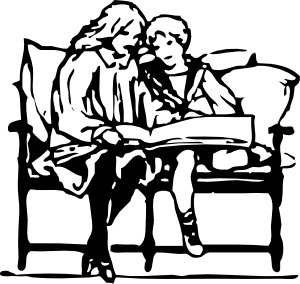I am embarrassed to admit that up until a couple years ago I thought all audiobooks were created equal, and by equal I meant simply. After all, how difficult is it to read a book aloud? My mom read aloud to me and my brother nearly every night when we were kids. We were always fascinated, for sure, but that was because of the story, right? A reader is merely the vehicle providing an aural form of reading. Or so I assumed.

Twenty plus hours of one audiobook finally opened my eyes... er.... ears? I was midway through listening to a monstrously sized box of cassettes when the library summoned its child back home from our playdate. Quite naively I picked up another copy of the same audiobook by a different reader. The difference was astonishing. In the defense of the second reader, I had already spent a good solid dozen hours reveling in the artistry of an amazing interpretation. Even had the second reader been brilliant, he still would have been the second.

A good reader is rather like a good movie or a good dancer. The qualities that make for an amazing performance demand a touch so delicate that if successful it will barely or not be noticed at all. Thus, oddly enough, a poor performance is likely to stand out far more than a stellar one. In a way, it's even like health... so long as things are running fine, you might even forget about it altogether, but the moment things deteriorate, every little detail is painfully apparent.

So I learned something. It's a lot harder to read aloud than I thought, and my mom is an awesome reader. Now I also remember the names of particularly impressive (in a good way) readers so I can check out their other works.
That is how I ended up with a C.S. Lewis audiobook collection that included The Great Divorce as read by Robert Whitfield. I've already discussed my thoughts on the story itself, but I wanted to add my thoughts on the audiobook presentation.

There's a reason why people like Jim Dale win awards for their audiobook presentations. Just an average performance requires one person to act an entire cast of characters using only voice. A good reader does this without resorting to growls for the men and sing-song for the women; somehow he or she will represent characters of all genders and ages so inconspicuously that the listener will never be distracted with irritating thoughts about how terrible that middle aged man sounds as a teenage girl and such. Robert Whitfield is splendid at portraying a range of average and extreme characters with what seems like great ease. I will note that one interpretation that did distract me with its unexpected and in my mind unduly diffident tone. However, considering that by now I've heard him voice well over fifty characters, one doesn't seem much of a tarnish to his track record.




March 16, 2010 at 4:51 PM
I can't find the name of the reader for Furies of Calderon. That's probably good, because she is the antithesis of all the good qualities you listed here.
Post a Comment